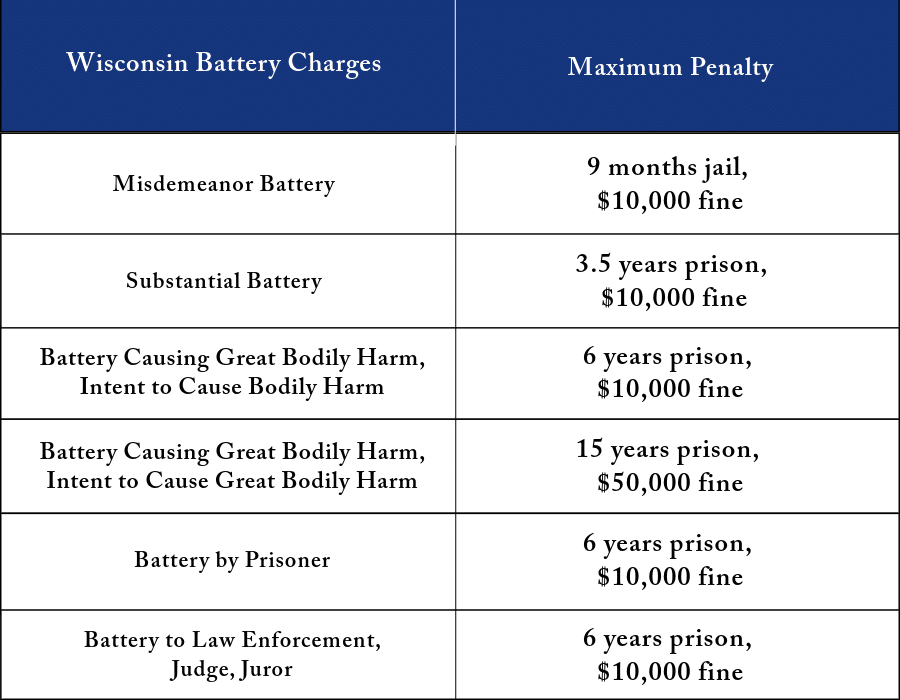Substantial Battery Charge in Wisconsin
- Our Location
Madison, WI
- Free Consultations
(608) 204-5807
What is Substantial Battery in Wisconsin?
In Wisconsin, certain circumstances can escalate a misdemeanor battery charge to a felony offense. This typically occurs when the injuries inflicted on the victim are severe or when the victim belongs to a protected class. One such escalation is substantial battery, which is classified as a Class I felony under Wisconsin Statute § 940.19(2).
A substantial battery charge carries harsher penalties due to the severity of the injuries caused, reflecting the increased seriousness of the offense. In contrast, great bodily harm cases—where the injury poses a substantial risk of death or permanent damage—can elevate the charge to a Class H or Class E felony, depending on the level of intent involved.

How Does Battery Become a Felony in Wisconsin?
The severity of a battery charge depends on two key factors:
- The degree of injury caused to the victim
- The victim’s status as a protected individual
A person may be charged with felony battery under these circumstances:
- The victim sustains substantial bodily harm → Class I felony
- The victim sustains great bodily harm without intent to cause it → Class H felony
- The offender intended to cause great bodily harm → Class E felony
- The victim belongs to a protected class (e.g., law enforcement, public officials, jurors, firefighters) → Felony charge, regardless of injury severity
Additionally, the law presumes a substantial risk of great bodily harm when:
- The victim is 62 years or older
- The victim has a physical disability that is either apparent to an observer or known by the defendant
Wisconsin law provides stronger protections for older adults and individuals with disabilities, recognizing them as particularly vulnerable to the effects of bodily harm.
Substantial Battery Defense Attorneys
What is Considered Substantial or Great Bodily Harm?
Substantial Bodily Harm Includes:
- Lacerations requiring staples, stitches, or tissue adhesive
- Bone fractures and broken noses
- Tooth loss or fractures
- Burns
- Petechia (ruptured blood vessels in the skin, eyes, eyelids, or mucous membranes)
- Concussions and temporary loss of consciousness, sight, or hearing
Great Bodily Harm Includes:
According to Wisconsin Statute § 939.22(14), great bodily harm refers to injuries that:
- Create a substantial risk of death
- Cause serious and permanent disfigurement
- Result in the loss of or impairment of an organ or appendage
The difference between substantial bodily harm and great bodily harm often determines whether the charge is a Class I, H, or E felony, depending on whether intent to cause serious injury can be proven.
Felony Battery Based on Victim Status
In Wisconsin, a battery can also be charged as a felony regardless of injury severity if it is committed against certain individuals. These protected individuals include but are not limited to:
- Public Officers
- Judges and Jurors
- Law Enforcement Officers (Police, Sheriffs, State Troopers, etc.)
- Probation and Parole Agents
- Firefighters and Commission Wardens
- Other Prisoners (Battery by an Inmate)
Even if the injuries do not meet the criteria for substantial or great bodily harm, a person can still be charged with felony battery if the victim belongs to one of these protected classes.
Defending Against a Substantial Battery Charge
If you are facing a substantial battery charge in Wisconsin, it is critical to work with an experienced criminal defense attorney who understands how to challenge the prosecution’s case. Possible defense strategies include:
✔ Challenging the Severity of Injuries – If the prosecution cannot prove that the injury meets the legal standard for substantial or great bodily harm, the charge may be reduced.
✔ Self-Defense – If the accused was protecting themselves or another person, a self-defense argument may apply.
✔ Lack of Intent – If the defendant did not intend to cause bodily harm, a lesser charge may be possible.
✔ Mistaken Identity or False Allegations – In cases where witness testimony is unreliable, mistaken identity or false accusations can be challenged.
✔ Violation of Constitutional Rights – If there were errors in the arrest, interrogation, or evidence collection, key evidence may be suppressed.
Experienced Legal Representation with a Substantial Battery Attorney in Madison, WI
If you have been charged with substantial battery in Madison, Dane County, or any part of Southern Wisconsin, you need a skilled criminal defense attorney on your side. At DK Anderson, S.C., we provide aggressive defense strategies to protect your rights and fight for the best possible outcome.
A substantial battery charge can have life-changing consequences. Don’t face it alone—contact DK Anderson, S.C. today for a free consultation.
📞 Call Now: (608) 204-5807
Frequently Asked Questions - Susbstantial Battery in Wisconsin
Simple battery is typically a misdemeanor, while substantial battery is a Class I felony if the victim suffers a serious injury such as a fracture, laceration requiring stitches, or concussion. The penalties for substantial battery are much harsher.
A conviction for substantial battery (Class I felony) can result in:
- Up to 3.5 years in prison
- Fines up to $10,000
- Felony record, which can impact employment, housing, and gun rights
Yes, in some cases. A defense attorney may negotiate for a reduction to misdemeanor battery, challenge the severity of the injuries, or present a self-defense argument.
Wisconsin law allows individuals to use reasonable force in self-defense. If evidence supports that the accused was acting to protect themselves or another, charges may be dismissed or reduced.
A local attorney understands Dane County courts, prosecutors, and legal procedures, which provides a significant advantage in building a strong defense. DK Anderson, S.C. has extensive experience defending against battery charges in Madison and across Southern Wisconsin.
Our Practice Areas
Drunk Driving
Whether you are charged with a first offense, or a fifth offense, our Wisconsin OWI attorneys can help.
Violent Crimes
A conviction for any one of Wisconsin's violent crimes will have significant consequences.
Drug Charges
Our Wisconsin Drug charge attorneys know the law and how to apply that law in the court room.
Domestic Violence
A conviction for a domestic violence charge in Wisconsin has additional consequences.
Property Crimes
Wisconsin property crimes include theft, forgery, and criminal damage to property.
Sex Offenses
Not much will change your life like a conviction for one of Wisconsin's sex offense charges.
Traffic Citations
Although less serious than a criminal charge, a traffic citation can effect your driver's license.





